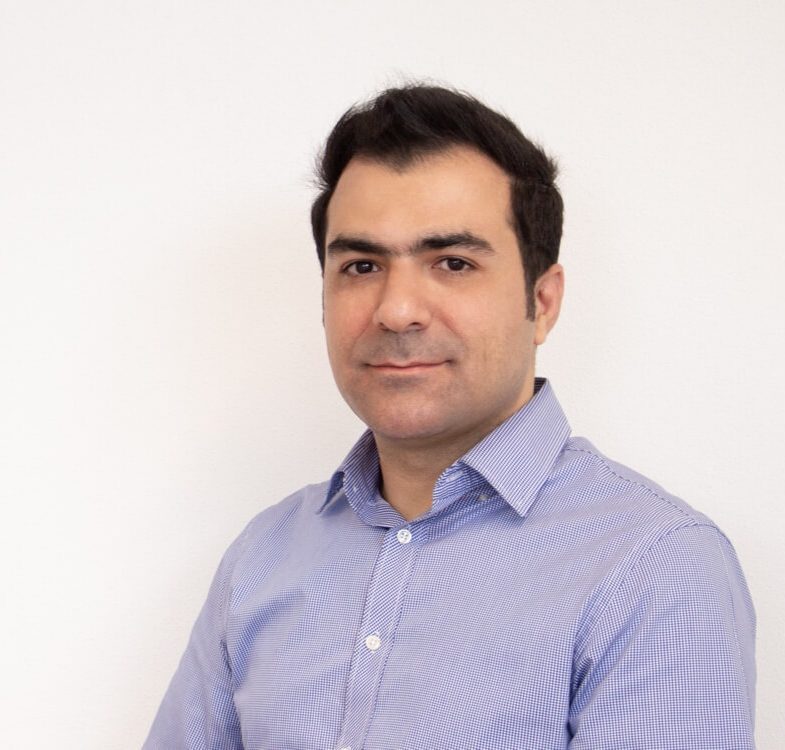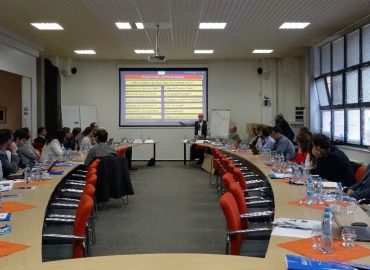Our first spotlight is on Dr Ghadir Pourhashem, who joined the ERAdiate team in early March 2017.
Given the broad scope of the ERAdiate project, which looks at enhancing the research and innovation dimensions of the University of Žilina in ITS, researchers in the team have complementary knowledge and competences, notably in project management, technology and innovations transfer into industry, intellectual property rights, public relations, in addition to the scientific and research skills in the ITS domain.
Dr Pourhashem is a Senior Transportation Researcher in traffic modelling, travel survey methodologies and data analysis to improve decision-making towards a more sustainable urban mobility development.
1. Who or what has influenced your decision to work in the field of transportation?
During my B.S. studies in Civil engineering and especially after passing transportation related courses like traffic engineering, transportation planning and railway design with one of the best professors in my university, I became attracted to this area of study. That professor encouraged me to do some research about transportation and traffic subjects and this increased my eagerness for this field. I assisted him in compilation of three books in transportation and traffic subjects and then I made my decision and chose transportation engineering for my Master’s studies and future career. I realised that considering transportation is a crucial issue in any city. And I believe we need to discover techniques to support and protect our cities from traffic problems such as heavy congestion while we are trying to promote our abilities in transportation.
2. Could you please tell us more about your research interests and what brought you to the ERA Chair project ERAdiate?
As a senior transportation researcher, my research interests include travel behaviour analysis, impact analysis of Information Communication Technologies (ICT) and Intelligent Transportation Systems (ITS) applications on travel pattern and transportation demands, land-use analysis, travel demand modelling, transit-oriented development planning, sustainable mobility planning and environmental impact analysis of urban transportation systems.
My long-term plan is to continue my work in further enhancing the quality of urban environment and transportation system for the benefits of public, economy and environment. When I was informed about the opportunity of joining and collaborating with ERAdiate, I found it in trajectory to my career plans, as well as my research skills and qualifications. I am very glad about this great opportunity and I am excited about exploiting my broad experience in both academic and government research for the development of UNIZA competences, competitiveness and research excellence in intelligent transportation systems.
3. What has been your greatest professional achievement and greatest obstacle?
My greatest professional achievement was training and working in Europe and the U.S. That gave me great opportunities to become closely familiar with new concepts in transportation engineering. In addition, I was able to use that knowledge and experience in my teaching and mentoring university graduate students in Tehran last year.
Challenges that we face are a crucial part of our career since they give us an opportunity to develop invaluable problem solving skills. In my career, knowing and experiencing the transportation systems and the communities encompassing these systems, and therefore affecting them, are important aspects of my career that allow me to have a comprehensive knowledge and overview of the related issues. Sometimes, however, I face challenges that are out of my control. The most challenging obstacle in my career perhaps come from difficulty or delays in my moving across the world, which are generally related to my nationality that severely limits my chances for taking new opportunities. For example, bureaucracy for non-EU citizens in some European countries may be long and exhausting. Despite this, I have always done my best to alleviate problems and I have seen good results. I believe all of us should be persistent about what we are passionate about and creative when it comes to problems if we want to reach higher levels of experience and knowledge in our career and life and be helpful to others as well!
4. What is your responsibility within ERAdiate?
My responsibility as an ERAdiate team member is to lead the Work package 5 (WP5), the main objective of which is to include effective management of research and innovations with orientation on development of research excellence and on competitive funding resources primarily within EU Framework Programmes. As part of my tasks in this position, I am also responsible for the preparation of project proposals directed to the Horizon 2020 challenges and other important EU programmes for regional development, cross border collaboration, and implementation of results for smart specialization as well as management/coordination of supporting activities in collaboration with UNIZA faculties.
5. What have been your first impressions about your new working environment (UNIZA, Zilina)
Indeed, I enjoy working in an international environment, which helps to broaden the mind. I believe that a dynamic and challenging environment is an essential part of any job. Therefore, nothing can produce better results and ultimately a better impression than maintaining a positive and can-do attitude that makes progress in your new position. And I found University Science Park’s ERA Chair project very supportive for providing such environment to its members.
6. Which area of ITS will have, in your view, a highest impact in the coming years?
ITS services have great potential to improve quality of life in cities and towns. For instance, emerging mobility technologies will have significant impacts on individuals’ travel behaviour and pattern, connectivity and apparently on the enhancement of environmental pollution such as CO2 reduction. Therefore, I would like to point out that there is no limit for potential benefits of applying ITS in vehicles systems and traffic management systems. The future of ITS is an open question (discussion) since the impact of ITS deployment is connected to each country priorities. To my knowledge, the big concern of most modern countries in the world currently and in coming years, in particular after the Paris agreement, is to reduce fuel consumption and greenhouse gas (GHG) emissions. To the best of my knowledge, efforts in ITS fields will focus on improvement of autonomous vehicles design and traffic management systems development which bring more energy efficiency, safety and smarter mobility through cooperative vehicle-infrastructure systems.
7. Since you have gained professional and educational experience in Europe, the U.S. and Iran, what is the position of Europe compared to these countries in terms of ITS development?
As I mentioned earlier, each country has its strategic priority and theme for ITS short-term and long-term development. And countries invest on ITS development according to their main concerns. For instance, for some countries like Iran, safety and air pollution mitigation are the highest priorities for authorities compared to Europe where connectivity and accessibility are the highest priorities. While the United States, the second largest contributing country to GHG emissions in the world, is much focused on ITS development for traffic management systems so far. But, The United States Department of Transportation recently prepared a strategic plan for ITS development by 2019 which provides a comprehensive outlook of the aspirations of the multi-faceted ITS community across the nation.
8. What is your personal philosophy of life?
My personal life philosophy is to always share my knowledge and experience as I learned so far with others especially in my work.
I also believe there is no failure in life. We should always think positively and learn from our past experience because learning has no end and trial and error are always part of personal growth.
Social media have strong influence on public opinion. They can change and shape society opinion and perspectives in different ways depending of what the objective is, whether it is true or not.
No judgement about people based on their race, colour, religion and being a loyal and supportive person for your friends is also part of my beliefs in personal and professional life. Being in touch with different cultures, life styles and attitudes through working with various international groups was a great advantage for me that made me stronger in my personal beliefs.
9. If you had not gone into your current line of work, what profession would you have chosen?
Definitely the medicine studies; to be more helpful for people following my personal philosophy of life.
Being a heart surgeon was my dream job when I was a child. But I am very happy that I have chosen transportation engineering field for my career.
10. What is the best advice you can give to a young researcher?
At the beginning, achieving targeted goals may seem impossible for young researchers. But I would like to say that a well-thought strategy is important as well as refining it as you gain more experience. So, get on a good track, then you can see the results.
Use the early years of your career to learn as many techniques and tools as you can, as they will help you with future problem solving capabilities.
Always keep your standards on high levels. Look at a problem with fresh eyes and don’t give up easily on a problem.
Don’t be single minded. You may have a single theme, but if it is a good one, then there can be many ways to build up on it.
Research sometimes may sound tedious; constantly try to do something innovative in your work that makes your efforts more pleasant.
Be open to talk to as many people about your ideas as you can because their feedback will help you improve your initial ideas.


